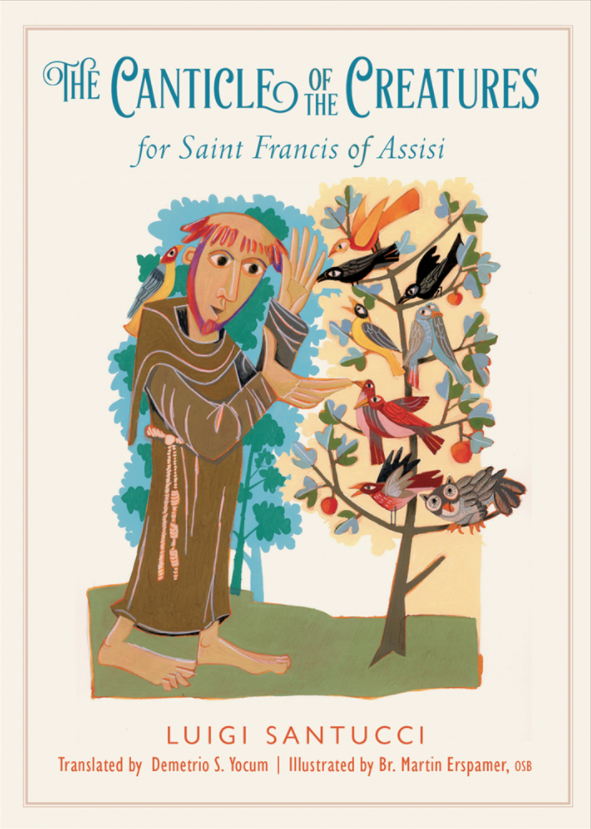Luigi Santucci. The Canticle of the Creatures for Saint Francis of Assisi,
Translated by Demetrio Yocum, Illustrustrated by Martin Erspamer
Brewster MA: Paraclete Press, 2017.
While there are many appropriate and equally laudatory adjectives that come to mind when reviewing this little gem of a publication, the one that rises to the surface most immediately for me is “Franciscan” … authentically “Franciscan.”
Franciscan spirituality, as I have grown to love it, is a uniquely holistic spiritual tradition. It is true that such could be said of many other traditions—Christian and otherwise. But what both endlessly inspires and baffles me about this wisdom school is its powerful juxtaposition of enduring insight and art, poetry and sagacity, simplicity and profundity, accessibility and unfathomability. It is what makes the Franciscan school of wisdom a resource that I can daily revisit without ever depleting its richness.

This enchanting publication—The Canticle of the Creatures for Saint Francis of Assisi—not only communicates this Franciscan spirituality, it richly embodies it. Designed as a kind of livre de poche (literally a “book that fits in your pocket”), this diminutive publication actually does fit into your pocket. Yet the quality of the paper, the charm of its design, and the elegance of its translation will caution you to put it into your very best pocket!
Born in the fertile mind of Italian poet and litteratus Luigi Santucci (d. 1999), the work revolves around the imaginative yet engaging reflections by some of God’s noble creatures who inhabited the life of Francis of Assisi. Multiple medieval sources recount Francis’ encounters with a wolf, nightingales, fish, bees, cicada and many others. The unexpected freshness that Santucci breathes into the remembrance of Francis’ encounter with this holy menagerie, however, springs from his provocative yet lucid crafting of reflections by these very creatures themselves, who muse on their distinctive encounters with the poor man of Assisi.
These endearing reflections are punctuated with magical illustrations by Martin Erspamer. Happily the quality of the paper and printing, design and production, allow these graphics to more than hold their own as vibrant counterpoints to the text without overwhelming that text. Such is important, since both the original writing and the quite deft translation by Demetrio Yocum contribute immeasurably to sustaining this mesmerizing counterpoint of text, visuals, language and spirituality.
This enchanting livre de poche, in the spirit of Il Poverello, illustrates that depth spirituality need not be gargantuan, boisterous or intimidating to be authentic. Rather, it is everyday; something you can slip into your pocket. Such everyday pocket-slipping will be enhanced if this lovely livre de poche finds its way into one of your pockets.
Edward Foley, Capuchin
Duns Scotus Professor of Spirituality,
Catholic Theological Union